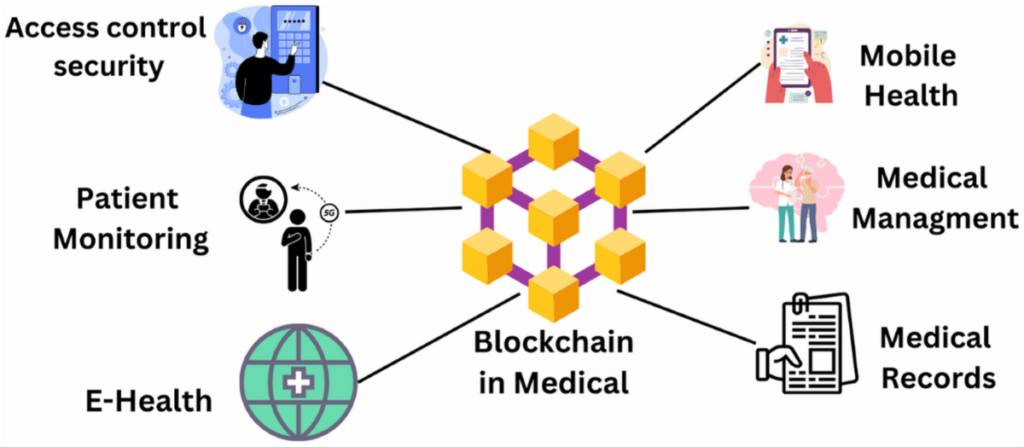Impact of Blockchain on Managing Medical Records
Introduction
In the era of digital transformation, the healthcare industry faces significant challenges in managing medical records securely and efficiently. Traditional systems often suffer from data breaches, inefficiencies, and lack of patient control over their own medical history. Blockchain technology offers a revolutionary solution to these problems by providing a decentralized, secure, and transparent method for storing and sharing medical records. This blog explores how blockchain is transforming medical record management, its benefits, challenges, and future prospects.
What is Blockchain Technology?
Blockchain is a distributed ledger system that records transactions securely across multiple nodes, ensuring transparency, immutability, and decentralization. Unlike traditional databases that rely on a central authority, blockchain operates on a peer-to-peer network where data is encrypted and stored chronologically.
In the healthcare sector, blockchain can be utilized to store medical records, track prescriptions, ensure patient data security, and facilitate seamless sharing of health information between hospitals, clinics, and insurance providers.
Learn more about blockchain technology
How Blockchain Improves Medical Record Management
1. Enhanced Data Security
Medical records contain highly sensitive patient information, making them a prime target for cyberattacks. Blockchain secures data through encryption and decentralization, making unauthorized access nearly impossible. Each transaction is verified and stored permanently, reducing the risk of data tampering.
2. Patient-Centric Control
With blockchain, patients gain control over their own medical data. They can grant or revoke access to healthcare providers as needed, ensuring privacy and transparency. This is a significant shift from traditional systems where hospitals and insurance companies primarily manage medical records.
3. Seamless Interoperability
One of the biggest challenges in healthcare is the lack of interoperability between different hospitals and clinics. Blockchain enables a standardized format for medical records, allowing seamless data sharing across healthcare providers while maintaining security and accuracy.
4. Fraud Prevention and Data Integrity
Medical fraud, such as insurance scams and fake prescriptions, costs the industry billions of dollars annually. Since blockchain records cannot be altered or deleted, it eliminates fraudulent activities, ensuring that only verified data is used for medical decision-making.
5. Faster Access to Records
Traditional medical records are often fragmented across multiple systems, leading to delays in patient care. With blockchain, authorized doctors and healthcare providers can access a patient’s complete medical history instantly, improving diagnosis and treatment speed.
Read more on how blockchain is transforming healthcare
Challenges of Implementing Blockchain in Healthcare
Despite its advantages, the adoption of blockchain in medical record management faces several hurdles:
- High Implementation Costs: Setting up a blockchain-based system requires significant investment in infrastructure and expertise.
- Regulatory and Compliance Issues: Healthcare data is subject to strict regulations like HIPAA (USA) and GDPR (Europe), which must be carefully considered when implementing blockchain solutions.
- Scalability Concerns: Processing large amounts of medical data on blockchain networks can be resource-intensive and may lead to slow transaction speeds.
- Data Ownership and Ethics: Determining who owns and controls patient data remains a legal and ethical challenge.
Future of Blockchain in Medical Record Management
The adoption of blockchain in healthcare is still in its early stages, but several promising developments indicate a bright future:
- Integration with AI & IoT: Blockchain combined with Artificial Intelligence (AI) and the Internet of Things (IoT) can further enhance personalized healthcare and remote monitoring of patients.
- Decentralized Health Platforms: Emerging blockchain-based platforms allow patients to securely share their medical history with doctors worldwide, improving global healthcare access.
- Smart Contracts for Insurance Claims: Automated smart contracts can streamline insurance claims, reducing paperwork and processing time.
As governments and private sectors recognize the potential of blockchain, we can expect widespread adoption in medical record management within the next decade.
Explore real-world blockchain healthcare solutions
Conclusion
Blockchain has the potential to revolutionize medical record management by enhancing security, transparency, and interoperability. While challenges remain, ongoing advancements and regulatory support can pave the way for a more efficient and patient-centric healthcare system. By adopting blockchain, healthcare providers can ensure better data integrity, faster treatments, and improved patient trust.
For businesses looking to integrate blockchain solutions, Techstertech.com offers expert IT and web development services to help healthcare organizations transition smoothly into the blockchain era.
Additionally, if you are looking for a natural way to boost your health and immunity, try Nature Mayaa—a premium Ayurvedic herbal supplement designed to enhance overall well-being.

